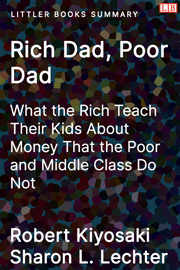Book Description
A game-changing book that teaches the fundamental lessons of personal finance, wealth creation, and financial independence.
If You Just Remember One Thing
Focus on acquiring assets that generate income (e.g., stocks, real estate, a business) rather than liabilities (e.g., cars, boa... More
Bullet Point Summary and Quotes
- Most of us are stuck in the "rat race" -- the endless routine of working for everyone but yourself. When you're in the rat race, other people receive the majority of the rewards of your work. However, we participate in the rat race because it's what's normal, and we fear society's disapproval when we deviate from it.
- Going to school, studying hard, and getting a good job will help you make a living, but it will not make you wealthy.
- We all experience fear and greed when it comes to money. The key is not to let these emotions guide your financial choices. When you use your hard earned money to purchase a fancy new car, that is greed. When you avoid stocks because of the risk of losing money, that is fear. Greed and fear can keep you from being rich. Expand your financial knowledge and learn about investments, risk, and debt to make more rational decisions.
- Many capable, talented, and hard-working people are not rich, or even poor, because they lack financial intelligence. This is because we are not taught financial intelligence in school, even though it's important for personal and societal prosperity. 75 to 80% of Americans have ineffective pensions. 50% of Americans are without pensions.
- Appraise finances (how much do I make and how much can I spend?), set goals (e.g., a new house in five years), and get educated (your mind is the best thing to invest in -- learn about finances, improve your professional skills, read relevant books, and make connections with people in your area of interest). The earlier you do these things, the more successful you'll be.
- Wealthy people are able to manage risks instead of avoiding them. It's not possible to become wealthy without risks and keeping all your money in a bank account. Invest in things that generate value like stocks, bonds, tax lien certificates, real estate, etc. Generally, the higher the risk, the higher the potential for return.
- The road to wealth is bumpy. You will need to find ways to stay motivated when things go astray. Make a list of "wants" (e.g., I want to be debt free) and "don't wants" (e.g., I don't want to end up like my parents) and refer to them occasionally for motivation.
- It is crucial to make sure you earn more than you spend. Create a worksheet to keep track of your monthly finances.
- Spend money on yourself before paying your bills. The necessity of paying the bills will give you the pressure and motivation to work harder to make more money.
- Read stories of other successful people. You'll find they all struggled on their way to success.
- Even financially smart people can become poor if they are lazy or arrogant. Lazy in this sense means avoiding things that should be done. For example, even if you work hard 60 hours a week, you can still be considered lazy if you ignore your familial problems. Arrogant means "ignorance plus ego", and it can lead you to make disastrous investments.
- Only invest in assets, not liabilities. Assets (e.g., stocks, businesses, bonds, real estate) make you money. Liabilities (e.g., cars, boats) cost you money. When you invest in assets, your money becomes employees working to create income for you. The more employees you have, the more money you generate.
- Your profession pays the bills. Your business creates wealth. In the beginning, you need to build your business while working at your profession.
- If a chef works five days a week and takes his extra income to buy a condo to be a landlord, then his profession is cooking, and his business is his condo. As your business grows, it will eventually replace your profession as the main source of income. This is how you gain financial independence.
- To maximize your wealth, learn about taxes. For example, filing as a corporation instead of an individual could save you money.
Rich Dad Poor Dad: Resources
- Download this summary and 173+ other top nonfiction book summaries in one book (PDF, eBook, DOCX)
- Buy the book
